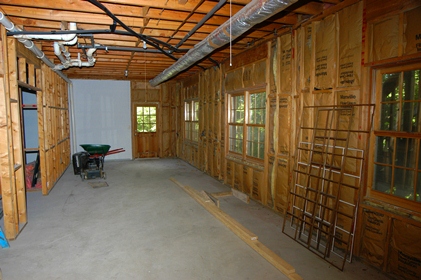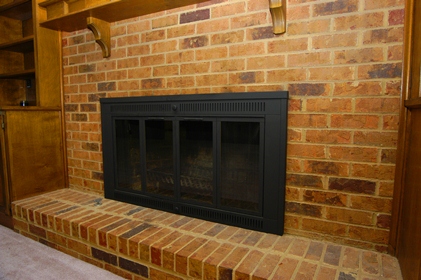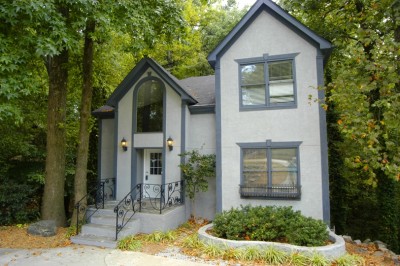ATLANTA HOME BUYER MISTAKES: AVOID THE DIRTY DOZEN PART TWO
ATLANTA HOME BUYER MISTAKES: AVOID THE DIRTY DOZEN
PART TWO: Fake Stucco, Mold, Chimneys and fireplaces, defective polybutyl plumbing
In the past, thousands of homes in the Atlanta area were constructed of Dryvit and other forms of fake stucco materials. Known in the trade as Exterior Insulation and Finish Systems (EIFS), this is a multi-layered exterior wall cladding comprised of an insulation board, a water resistant base coat, and a hard coat of acrylic co-polymer on the outside.
There is nothing inherently wrong with these construction materials. However, the standard method of construction in use at the time – combined with antiquated building codes – left thousands of homeowners with termite, moisture, and rot problems.
Because the stucco material extended all the way to the soil, termites were able to gain access to the home, tunneling behind the sheets of foam that are part of the construction method. And, as we know from above, termites cause problems for homeowners.
For others, moisture entered the home though openings around windows and doors that were improperly flashed, causing rot and a failure in structural integrity in some homes.
A national lawsuit solved most of the problems for homeowners. Companies popped up that mitigated the problems by cutting off the fake stucco before it touched the ground. Additionally, they were able to fix the moisture problems.
Alert home inspectors will assist you in making sure the home you are considering has been through this improvement process.
 MOLD is one of the most difficult of the “dirty dozen” to completely eliminate, and some form of mold is present in every older Atlanta home. After all, mold is a naturally occurring organism. Of great concern are the strains of toxic mold that may cause health problems down the road for inhabitants.
MOLD is one of the most difficult of the “dirty dozen” to completely eliminate, and some form of mold is present in every older Atlanta home. After all, mold is a naturally occurring organism. Of great concern are the strains of toxic mold that may cause health problems down the road for inhabitants.
While it takes a trained eye to spot some of the TOXIC MOLD strains, others look like old food in the refrigerator and are easy to identify. Many recent hurricane victims are seeing these mold blooms in their homes when they return. A good wire scrub brush and some household bleach can kill many strains of mold. However, problems can occur when mold is behind walls or you are breathing airborne mold particles during removal. So, unless you are tackling a very small, accessible mold growth, this is a process that is probably best left to professionals. Costs for mold mitigation range from $1,000 to many thousands of dollars. CHIMNEYS AND FIREPLACES –
CHIMNEYS AND FIREPLACES –
Homeowners are generally aware a chimney needs maintenance. Even if it’s nothing more than an annual cleaning of the chimney flue to remove soot and combustible residue that build up from use over time, chimney maintenance is important.
Settling chimneys can pull away from the house, potentially exposing combustible materials through cracks. In addition, firebrick on the interior of the fireplace actually does wear out over time and dampers should function properly. Chimney cleaners are rather affordable ($100 plus), and most include an inspection of the chimney and fireplace for possible fire hazards.
DEFECTIVE POLYBUTYL PIPE OR PLUMBING –
If a water service line was installed between 1978 and 1995, there’s a high probability that it is constructed using polybutylene piping, instead of the traditional copper water service line.
Many Atlanta homes built during this time period had polybutylene blue pipe installed as the service line running from the water meter on the street to house itself. And, some homes have this pipe as the interior plumbing system for the home.
Widely touted as the “pipe of the future” because of the ease of installation, polybutylene pipe has actually failed in most instances and had to be replaced. A national lawsuit brought relief for homeowners who experienced a failure and filed a claim for compensation.
Buyers should ask about the history of the plumbing system and inspectors should be alerted to the potential existence of polybutylene piping.
ASTUTE ATLANTA HOME BUYERS
should know the telltale signs of the presence of a “dirty dozen” threat in the home and raise a red flag when tracks are spotted. Some of the “dirty dozen” are easy to eliminate and are really no more than a nuisance. Others are downright obstinate, and may be near impossible to completely eradicate from the home. Remember, you will find a wealth of information and assistance if you start by alerting your home inspector to these threats.
SALLY ENGLISH AND THE ENGLISH TEAM ASSIST ATLANTA HOME BUYERS
in the search for homes of high emotional and financial value. We also coach our Atlanta home buyers how to avoid the dirty dozen home buyer mistakes. We also know CONTACTORS WHO CAN REPAIR the dirty dozen house defects if you find a home you can’t live with out that has a dirty dozen problem
CALL SALLY ENGLISH AND THE ENGLISH TEAM
for great advice on buying or selling an Atlanta Georgia home: 404-229-2995. We look forward to hearing from you.

